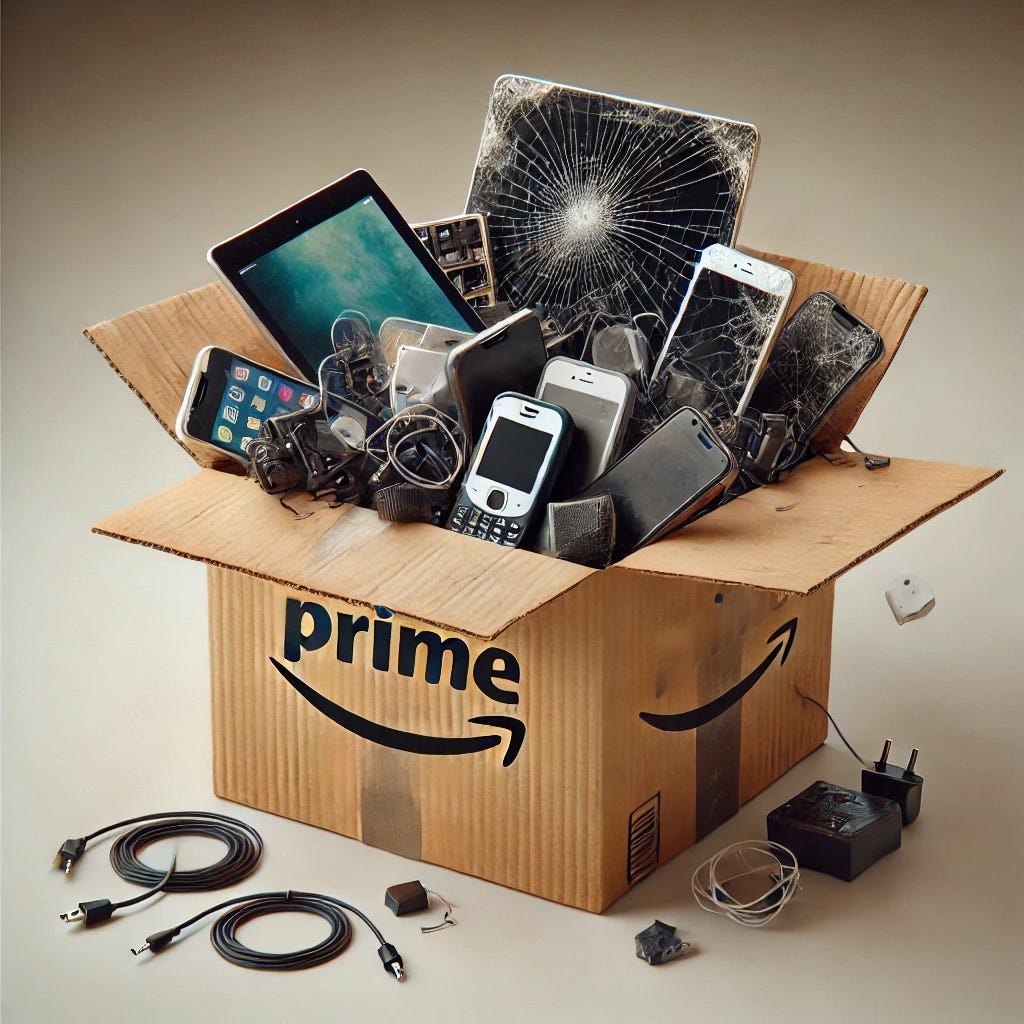Amazon Electronics Primed For the Dump
On America's most sacred holiday (Prime Day), the specter of ditched devices looms large. A new non-profit aims to change that. Also: is Australia becoming a dumping ground for unfixable stuff?
For the past two weeks, I’ve been peppered with ads of rapper Megan Thee Stallion promoting America’s favorite holiday: Prime Day. A holiday promising to solve your everyday problems with another purchase arriving at your door (at ever-faster speeds.)
When the company is not beating down unionization efforts and ignoring the heat workers face in its warehouses, Amazon is an unrivaled giant in the e-commerce space. And that makes Prime Day is a central pillar to Amazon’s online experience. And the volume of purchases the company sees continues to grow year after year.

Electronics that won’t go the distance
The top 2 items based on total dollars spent during Prime Day are, unsurprisingly, consumer electronics. With the sheer volume of electronics bought on Prime Day, there is more flood of devices that will be abandoned in the coming years—and these top two products are prime examples:
Apple Watch Series 8
Blink Outdoor Camera 3rd Gen
The issue with the Apple Watch is not nearly enough software support. Apple has already ended support for three “newer” models: the Series 5, Series 4 and the original SE. The Series 5 Apple Watch launched in September 2019 (almost five years ago). What's the problem with this? Not only will products that don’t receive software supports become slower and buggier, but most of all they will become less secure when they don't receive regular updates. In short: if you want to do something good for the environment by holding onto your device for longer, you are in turn punished with worsening products.
The Blink Outdoor Camera presents an additional problem, a growing portion of smart-home devices and other consumer electronics that are cyber insecure. Even while people connect these smart-cameras to their homes to protect themselves—they are also often opening themselves up to issues with their data (and even their video footage) being stolen without their consent.
It puts the smart device in the landfill!
The rest of the top 10 list are no different, facing many of the same issues:
Fire TV Stick
Ring Video Doorbell
Ring Floodlight Camera
Echo Dot 5th Gen
Apple AirPods 2nd Gen
Bissell Little Green Cleaner
Apple iPad 9th Gen
Echo Show 5th Gen
Prime Day is a reminder that both physical and digital problems are causing problems for a massive number of electronics bought every single year. No to mention, if we expect our electronics to continue lasting barely longer than a couple years, the waste is going to continue to pile up.
We could change this by requiring longer software supports, designing devices for long-term maintenance and upgrades, as well as creating pathways for consumers to use devices when manufacturers leave them behind. If nothing changes, people and the environment will be worse off.
Big announcement: a new nonprofit to change this
That’s why Paul and I have teamed up with a group of leading experts from the worlds of information security, reuse/refurbishing and public advocacy to create a new non-profit The Secure and Resilient Future Foundation (SRFF), a nonprofit dedicated to forever burying the lie of “security through obscurity” that promotes anti-competitive, wasteful and anti-consumer business practices. SRFF (pronounced “SURF”) works to foster secure, transparent, resilient, and sustainable technology ecosystems. The current model needs to change, and we know there needs to be a conversation beyond right to repair to inform industry and policymakers.

We will be giving regular updates through Fight to Repair as we continue to grow the work of the organization. In the meantime, if you want to make a donation to support SRFF use the button below. A donation of $50 or more will get you a year of premium access to Fight to Repair Newsletter - a 16% discount for our annual subscription.
Other News:
Is Australia becoming a dumping ground for unfixable stuff?
Australians love their appliances - but have very few options to fix them when they break, writes Leanne Wiseman, a Professor of Law at Griffith University writes over at The Conversation. While the average Australian household has five large appliances and up to ten smaller ones, appliances that break are often not repaired due to high costs and difficulty in obtaining spare parts. That’s because Australia’s current consumer laws provide limited protection, with no penalties for manufacturers who do not offer repair options. And, as the UK, EU and large US states like California pass right to repair laws, Australia risks becoming a dumping ground for low-quality appliances, Wiseman writes. To fix the issue, Australia needs policies and infrastructure to support large-scale repair activities to extend the life of appliances and reduce electronic waste.
Patchwork of Right to Repair Laws Grows
On May 28, 2024, Colorado became the fifth state to adopt a “right to repair” law, signed by Governor Jared Polis (HB 1121). The Governor’s signature added Colorado to California, Minnesota, Oregon, and New York in enacting repair laws for consumer devices, with many of those laws beginning to take effect including New York state’s law, which took effect on December 28, 2023, and California and Minnesota, where passed right to repair laws went into effect July 1st. For Colorado residents, previous laws granting the right to repair wheelchairs and agricultural equipment have already gone into effect. But they’ll have to wait to be able to exercise their right to repair electronics until January 1, 2026, while residents of Oregon won’t see their full right to repair take effect until July 1, 2027. The laws broadly require manufacturers of electronics that offer repair services through authorized providers to make parts, tools, and documentation available to independent repair providers and consumers.
HMD’s New Skyline Phone Emphasizes Repairability
Engadget reports that phone maker HMD has unveiled its newest own-brand smartphone (HMD also makes phones under the Nokia brand) called “Skyline” with repairability as a leading feature. The new phones are available starting in August and will cost $499. The big feature for Skyline is ease of repairability, with a back cover that can be easily removed, allowing for a user or a third-party shop to replace a broken screen, a worn-out battery, or a bent charging port. Replacement parts are also available in select markets from iFixit, which said Skyline will have almost the repairability levels of the Fairphone, one of the first repair-centric mobile devices.
EU Regulation Governing Ecodesign for Sustainable Products Goes Live
A write up over at JD Supra notes that new regulations governing Ecodesign for Sustainable Products Regulation ( or"ESPR") went into effect in the EU on July 18th. The new regulations replace the previous “ED” - or Ecodesign Directive 2009/125/EC and expands the reach of ecodesign reguations from energy-related products to almost all types of physical goods. New and more robust ecodesign requirements target product durability, energy efficiency and reparability, calling for increases in the use of recycled content and reduced use of substances that pose ecologic concerns. The goal of the new rules along with legislation like the Green Deal and Circular Economy Action Plan: to achieve a climate-neutral circular economy by 2050. Covered products include consumer electronics, household appliances, commercial machinery, toys, furniture, textiles; excludes food, feed, medicinal products, living plants, animals, products of human origin, and defense-related products.
Videos highlight Congressional support for right to repair bills
The folks over at Aftermarket News point out a new video series from the pro-repair Auto Care Association that features current Capitol Hill lawmakers promoting the REPAIR Act, a proposed bill that would create a federal right to repair vehicles akin to laws already on the books in Massachusetts and Maine. The featured lawmakers include REPAIR Act sponsor Rep. Neal Dunn (R-FL) as well as co-sponsors: Reps. Marie Gluesenkamp-Perez (D-WA), Warren Davidson (R-OH), and Brendan Boyle (D-PA). “Are we going to live in a culture where we rely on technology that’s just a black box? Or are we going to hew to a…national heritage of self sufficiency and being able to fix the things we rely on ourselves,” Rep Glusenkamp-Perez asks in her video. The Auto Care Association applauded the lawmakers for their sustained support expanding auto repair. The videos can be viewed on the Auto Care Association’s YouTube page.
In other news: the American Motorcyclists Association also signaled support for the REPAIR Act. In a letter to the House Energy and Commerce Committee by the Auto Care Association, on behalf of the AMA and other REPAIR Act stakeholders, the group urged Congress to pass the REPAIR Act, and called out the need to include motorcycles among the vehicles covered under the Act.
“It is imperative that all language regarding motorcycles remain in the REPAIR Act, AMA Government Relations Director Nick Haris said. “This bill could have immense implications for the future of motorcycling, and we continue to support all efforts to allow motorcyclists to repair their vehicles as they see fit.
Battling Big Ag means safeguarding farmers from data exploitation
Modern, “precision ag” farming technology is rife with sensors and boosts efficiency, but it also raises antitrust issues, as the class action lawsuit challenging Deere's repair restrictions - which lead to costly and delayed authorized repairs - shows us. That puts the onus on Farmers to grasp illegal antitrust practices, Clemens Jongens writes over at Future Farming.
Forcing farmers to buy unnecessary integrated sensors or bundled products limits competition and inflates costs. Such practices are potentially illegal if they restrict competition. Just as important: farmers often lack control over their data, which is collected en masse by equipment makers, risking exploitation by large corporations, potentially manipulating market prices. More than ever, it is important for farmers to understandg antitrust laws in order to call out and prevent anti-competitive practices and maintain fair competition in the agricultural sector.
In India: a call to end planned obsolescence
India's e-waste is around 1.8 million tonnes per year, growing fastest globally. A proposed Right to Repair (R2R) Law: Part of Mission Circular Economy, aims to empower consumers, reduce waste, eliminate e-waste toxicity, and create jobs in the repair industry, Bhavdeep Kang writes over at Free Press Journal. Among other things, India’s government has created a government repair portal providing access to repair information. Manufacturers are being urged to upload product details and repair manuals. The bigger problem, however, is planned obsolescence: Products that aren’t designed to last, fueling rapid replacement and e-waste. A right to repair framework would prevent consumer exploitation and monopolistic practices by allowing independent repair businesses access to authentic parts and information.





